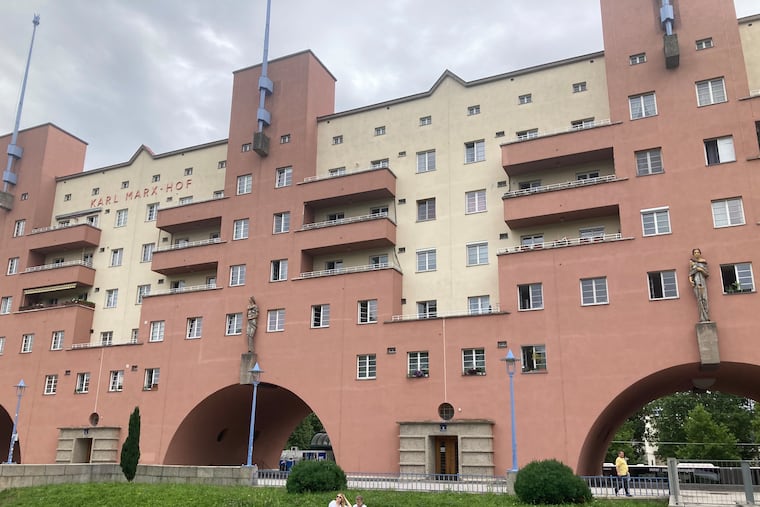Is this European city a model for Philadelphia’s affordable housing? One Council member thinks so.
Councilmember Jamie Gauthier's recent trip to Vienna reaffirmed some of her ideas about Philadelphia's housing policy.

For progressive politicians and policymakers, the Austrian capital of Vienna has long been a housing policy touchstone.
That’s because Vienna, despite its history as an imperial metropolis studded with ornamented palaces, is one of the most affordable major cities in Europe. Over the last century, the city government built 220,000 affordable apartments and funded a further 200,000 cooperative units.
Councilmember Jamie Gauthier went to Vienna earlier this year to learn more about how Vienna’s government has ensured rental homes remain attainable for everyone, even as the population grows and other European capitals grow ever more unaffordable.
“I was impressed by the amount of money they invest in social housing, by their existing stock, and by the amount of units they’re producing every year,” Gauthier said. “These aren’t people that are just walking around saying ‘housing is a human right.’ They’re doing things to actually embody that principle.”
Gauthier is the head of City Council’s housing committee and has carved out a name for herself as a proponent of affordable housing policy. She went to Vienna and Berlin earlier this year as part of a trip sponsored by Local Progress, an organization for left-leaning elected officials, as did Working Families Party Councilmember Kendra Brooks and a cohort of politicians from Chicago.
Gauthier believes there are lessons Philadelphia could learn from Vienna, although she acknowledges vast differences between the two cities.
Consistency in housing support and funding
Vienna’s commitment to municipally owned housing dates to the end of World War I, which transformed the city from the center of an ancient empire to the capital of a small nation. Following the war, a Social Democratic government took power and raised taxes on elites — who had nowhere else to go — and used it to buy up land across the city at huge discounts. The government proceeded to build tens of thousands of public housing units, which still exist today.
Gauthier toured the monumental Karl Marx-Hof, an apartment complex three-quarters of a mile in length completed in 1930 that includes plenty of green space, rich amenities, and excellent transit access. The so-called Red Vienna government was socialist, hence the name of this project, but also democratic so they named another complex after George Washington.
“Although [Karl Marx-Hof] is one of the first social housing developments, they are still pretty nice and well-maintained,” Gauthier said. “Even their oldest forms of municipal-owned housing are in good condition, even as they continue to build.”
The Social Democratic Party has remained in charge of Vienna for much of its recent history, with the large exception of a Fascist coup in 1934 (where the socialist leaders were shelled in Karl Marx-Hof) and the Nazi annexation in 1938 followed by World War II. Even as social housing construction expanded, the city government ensured it remained mixed-income by means-testing people only when they first arrived and by keeping the income threshold relatively high.
In more recent decades, Vienna’s policy has depended more on municipal subsidy for limited-profit housing developments. These aren’t run by the government but are set up to ensure that profits spun off go back to the city to subsidize future housing. Similar models on a far smaller scale are being pursued in New York City and Montgomery County, Md.
Vienna’s historic commitment to housing compounds on itself. The city government’s huge and long-standing ownership and subsidy of affordable units means it is known as a reliable and transparent actor. That makes private-sector actors comfortable helping to fund the projects.
“There’s a consistency in knowing this housing is going to be funded and supported,” said Vincent Reina, a professor of urban planning and housing at the University of Pennsylvania. “That’s really important, not just for the residents but also for financial markets feeling confident about the viability of this housing stock.”
Prioritizing vacant land for affordable housing
So what, exactly, can American municipal policymakers learn here?
For one, Gauthier notes that Vienna reserves a large amount of vacant land, including recently a shuttered airport, for the development of these social housing projects. She has long advocated that Philadelphia’s Land Bank reserve more land for affordable housing projects.
“They are prioritizing their use of vacant land,” Gauthier said. “In our city, we just want to get the land out the door. They are focused on saving their publicly owned lands for housing developments to make sure that people are housing secure.”
Critics of reserving more units strictly for affordable development, usually by nonprofit actors, have long noted that there isn’t enough subsidy to redevelop all Philadelphia’s empty lots. But Gauthier says that’s another policy lesson from Vienna: The public sector needs to prioritize expanding the affordable housing supply.
“To solve the city’s housing crisis would take a lot of money, but it’s important so we should wrap our mind around that and make it happen,” said Gauthier, who noted the $1.25 billion bond for affordable housing the Chicago’s progressive mayor recently passed.
“We passed the [$400 million] Neighborhood Preservation Initiative, and there’s no reason why we can’t invest even more because housing is such a high priority and touches all kinds of other areas,” said Gauthier.
No American city is in a position like Vienna where the local government controls, or at least has a stake in, the ownership and construction of homes where a majority of the population lives. But Reina agrees with Gauthier that Philadelphia’s large amount of vacant land, combined with innovative funding policies, could begin to make a difference.
“Philadelphia is really uniquely positioned in that there’s actually a fair amount of land that still can be disposed of,” Reina said. “Low cost land, low cost financing, and really strategic thought about long-term mixed income housing that has real affordable components is a real opportunity.”